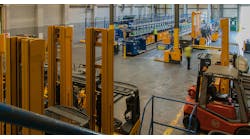Boeing Shoots for Stars
A Boeing executive says investing in education ensures asteady supply of its most powerful resource: Engineers!
by Tom Andel, chief editor
Many CEOs think the decisions they make mean life or death.Some of them are right. They're the ones whose products must be so carefullyengineered that one bad part can cost hundreds or even thousands of lives.
Take the products Boeing builds, for example. Its rocketshave lifecycles as short as two minutes. Its aircraft can last decades. Bothare built on years of engineering expertise, from design, through supply chainplanning, to production. Lives and careers depend on the quality of theinformation supply chain feeding those disciplines. That chain is forged byquality education and linked by many engineering disciplines. In today's tightlabor market, it's hard to find engineers who are products of such a chain.
That's a CEO-level concern, says Joseph L. Maltese, vicepresident of production operations for Boeing's C-17 Integrated Product Team.Maltese and his company are dedicated to supporting high-quality engineeringeducation in order to guarantee a supply of talented graduates to keep Boeingcompetitive. Maltese is so passionate about this need that he recently wrote aletter to the Society of Manufacturing Engineers, praising them for fundingbroad-based curricula at schools across the country. Math and science are justthe beginning, he wrote. Equally important are the abilities to:
• Applyknowledge of mathematics, science and engineering;
• Designand conduct experiments as well as analyze and interpret data;
• Designa system, component or process to meet desired needs;
• Functionsuccessfully on multidisciplinary teams;
• Understandprofessional and ethical responsibility;
• Engagein lifelong learning;
• Communicateeffectively (oral and written).
Maltese is particularly adamant about the need formultidisciplinary teams. His "Integrated Product Team" employsmechanics, inspectors, quality engineers and manufacturing engineers. Not onlyis the team multidisciplinary, but so is each of its members. MHM interviewed Maltese to explore the strategicimportance of broad-based engineering education to the success of any company.
MHM: Why are you sopassionate about engineering education?
Maltese: Theaerospace industry is boiling down thanks to mergers and reduced dollar volumefrom the federal government. We're splitting new programs and commercialbusiness with Europe, so there's not a lot of market growth -- only about fourpercent a year. We're looking for velocity -- how fast we can get things donewhile maintaining accuracy. We can no longer afford what we've always had inaerospace, which is a lot of specialists who get things done, then pass themoff to the next set of hands. We need a more well-rounded manufacturingengineer who can also do the job of the industrial engineer and the qualityengineer.
MHM: Is engineeringeducation lacking?
Maltese: We stillseem to be missing the abilities to work on a team using team concepts underthe lean manufacturing initiative, as well as the systems engineering skills ofgetting the right answer to a problem up front.
MHM: How is this affecting the current labor pool?
Maltese: Thegraduates we get from engineering schools have good math and science skills,but traditional education doesn't give them good business sense. Outside anIntegrated Product Team environment, engineers are allowed to compartmentalizeand therefore they don't share information well.
MHM: It'sinteresting that the Society of Manufacturing Engineers identified supply chainmanagement as one of those disciplines that was in high demand. Is that oneaspect of engineering that Boeing prizes?
Maltese: It's beenidentified as one of our critical skills. In a lean environment using JITdelivery processes, you can't stand disruption because there's no back-up tothat disruption. We used to be able to go to the stock room and just pullanother component and send the reject back to the supplier so they can fix it.In the last two years, two of my major assemblies hit a bridge on their wayhere. That put me one month out of cycle for the rest of the product. When thelate part arrives you have to work overtime to get it caught up with the restof the assembly. We can build only one of our products a month. We've optimizedproduction, but the area we've not optimized is the supply chain. That entailshow long it takes to get from Point A to Point B, how many times you changeinbound product from container to container, how long it takes to unwrapproduct and get it to the line, making containers ergonomic and reducingpackaging waste.
MHM: Do you requirethis level of supply chain competence from your suppliers?
Maltese: You have tolook at each element of a company. One supplier had to get about 3,000 partnumbers built for us. They presented a good supply chain and MRP system forcontrolling the inventory and meeting the schedule. But this was all shown tous on a laptop -- it wasn't in the company itself. Some time passed withoutshipments. Finally we got on the phone with them and they sounded confused.They didn't know what was due to us. We sent a team out to look at theirprocess and found there was no computer system to tell them what to do andwhen. They were using a piece of paper. I took a major production hit for that.It put me two positions out on wing production.
MHM: What lessonsdid you learn from that?
Maltese: We put ateam together in supplier management where we validate the supplier's logisticsand MRP systems to be sure they have everything in place and working on thefactory floor.
MHM: That's a keysupply chain lesson. Does Boeing's CEO appreciate its importance?
Maltese: I just attended a Boeing leadership meeting atwhich our CEO talked about critical skills. He said we need to attract the bestand brightest in production control and supply chain because they're criticalto our processes. That's a big change from years ago when we only talked aboutcash flow and sales in these meetings.
MHM: What roleshould the CEO play?
Maltese: The CEOmust be interested in getting the employees into lifelong learning. The trickof the whole game these days is how fast can you get from concept to deliveryof a fresh product. Development cycles in our industry are very long, and bythe time you get the product out and certified and you're delivering it, theeconomy has changed. That's why a CEO must support continuing education, eitherwith some kind of credit or funding, bringing it on-site or using regionalcenters like the California Manufacturing Technology Center at California StateUniversity, Long Beach. A person who graduated at the top of his class in 1980is not a person who knows what's being taught in school today.
MHM: How is Boeing'sinvestment in continuing education paying off?
Maltese: About 167of my engineers have gone through this SME-funded program at Long Beach State.Some real jewels have come out of that. Sometimes those people move on, butit's a sacrifice we make. We pay 100% of their tuition and books to go toschool. The only thing they have to provide is their own time.
MHM: Is the U.S.providing enough job opportunities for engineering graduates?
Maltese: The newsmedia keep pushing the fact that the U.S. is moving to a service economy. Idon't think we should allow that to happen to us. Wealth is created throughmanufacturing, not services. It's been reported that companies are moving outof California because of the high cost of labor. But there's a story in SanDiego that's a reversal to that. BFG Aerospace was down to 450 people. They gottogether with the union and decided they were going to fix the situation. Theyused lean initiatives to turn the place around and became the low-costproducers for BFG. They closed plants in Arkansas, Hagerstown, and three orfour other small facilities and moved 8,000 jobs back to California.
MHM: What role, ifany, should government play in fostering engineering strength?
Maltese: I thinkRoss Perot had the right idea when he suggested during the '92 presidentialcampaign that states should target manufacturing markets they want to capture.Each state would then build its engineering education and support around thatindustry and take the world market. That's what Europe has done. I studied theworld market for aerospace and this approach works in Germany, France andEngland. Every district in England is going after a specific market. TheManchester area has concentrated its education and development money in thecasting and forging market. In the U.S., companies are moving from state tostate and from state to offshore all the time because there is no strategy.
Maltese concluded that it's up to CEOs to set theengineering strategies for their companies. He suggests you follow Boeing'slead in working with local colleges and universities to develop curricula thatfit the continuing education needs of your existing workforce while providingrelevant broad-based engineering education for the workforce of the future.


